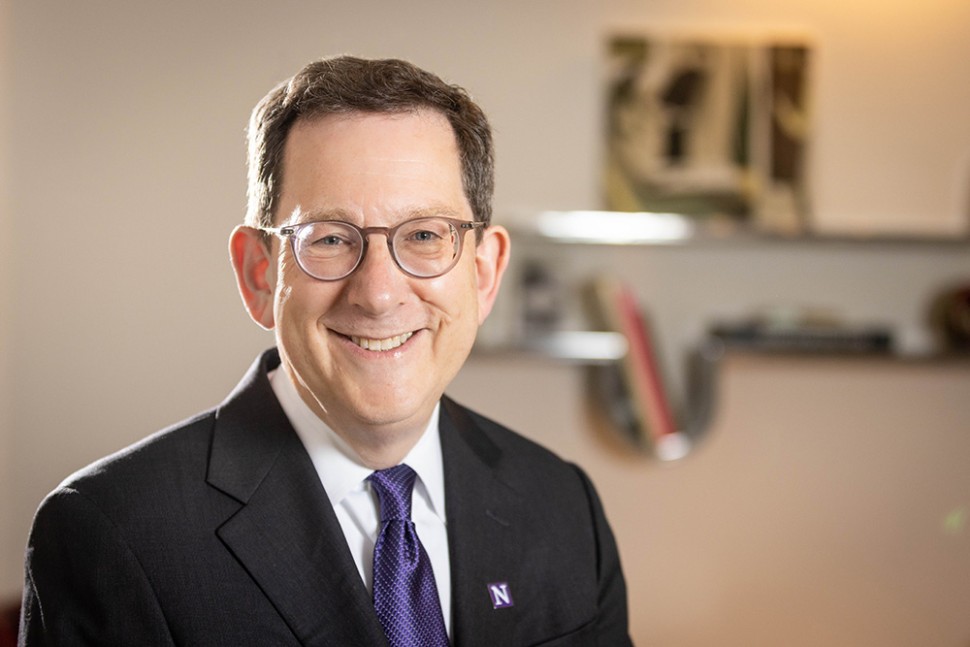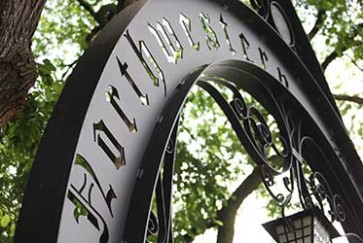Michael H. Schill, the president of the University of Oregon, has been named the 17th president of Northwestern University, Northwestern's Board of Trustees announced today. Schill will begin his presidency this fall.
Schill has led Oregon (UO) since 2015 and holds a tenured faculty appointment in the University of Oregon School of Law. He previously served as the dean and Harry N. Wyatt Professor of Law at the University of Chicago Law School, the dean of the UCLA School of Law, and was a chaired professor at NYU and the University of Pennsylvania.
A first-generation college graduate, he earned an Artium Baccalaureus (AB) degree in public policy from Princeton University and a Juris Doctor (JD) degree from the Yale Law School. Schill’s scholarship focuses on affordable housing, land use and race discrimination in the housing market.
“I am thrilled, honored and humbled to join Northwestern, one of the world’s most prominent universities,” Schill said. “Northwestern has a long tradition of educating the brightest minds and pushing the boundaries of research and innovation.”
Schill said he looks forward to enhancing Northwestern’s standing as an innovation hub for the Chicago area, for Illinois, for the nation and the world.
“Northwestern is strong in so many areas – the arts and humanities, the physical and medical sciences, the professions, on the athletic fields and in the classrooms,” he said. “Northwestern is blessed with a University community whose deep commitment to human potential is awe-inspiring. I believe that by working together, we can all make a difference, and I am looking forward to joining you for the next great chapter in our university’s history.”
Schill’s selection comes 16 months after President Morton Schapiro announced his departure, having served for more than a decade at the helm of Northwestern. The University named Rebecca M. Blank as Schapiro’s successor in October 2021. In July 2022, Blank announced that she was diagnosed with cancer and would be unable to fulfill her role as president. Following Blank’s announcement, the Chair of the Board of Trustees reengaged Northwestern’s 34-member Presidential Search Committee, which ultimately recommended Schill to the Board of Trustees.
“The selection of President-elect Schill reflects the values and input of our community and institution and was informed by his deep commitment to research and academic rigor, his focus on student access and success, his commitment to diversity, equity and inclusion, and demonstrated administrative leadership,” said Peter Barris, chair of the Presidential Search Committee and incoming chair of the Board of Trustees. “President-elect Schill is ambitious and eager to build on Northwestern’s successes and boldly lead the institution to its future.”
From the onset of the search, the Presidential Search Committee solicited input from all areas of the University through written submissions, listening sessions and open forums with various constituencies, including faculty, students and staff. Input provided to the search committee was essential in crafting the position profile and informed the selection process. The committee comprised a diverse mix of members from across Northwestern, including trustees, faculty, students, staff and alumni leaders. The faculty and students represented the broad domain of schools at Northwestern and included undergraduate, graduate and professional students.
“Schill is known for his sense of dedication and passion that envelops everything he does,” said Jide O. Nzelibe, the Benjamin Mazur Summer Research Professor of Law and a faculty representative on the search committee. “Schill completely immerses himself in his environment, prioritizing faculty and academic excellence, as well as student quality and accessibility across all backgrounds. He is a president who will go above and beyond what is expected.”
“President-elect Schill comes to Northwestern with a multitude of leadership experiences at public and private research institutions, a demonstrated commitment to access and inclusion, and an established record of supporting research and academic excellence,” said Paola Sapienza, the Donald C. Clark/HSBC Chair in Consumer Finance Professor at the Kellogg School of Management, and a faculty representative on the search committee. “I am confident that he will lead Northwestern toward even greater achievement.”
The committee prioritized Northwestern’s values and commitments to diversity, equity and inclusion throughout the process, and it embraced the University’s Diverse Candidate Slates Policy, said Barris, who also serves as vice chair of the Board of Trustees.
“I am very pleased that Michael Schill has been elected as Northwestern’s next president,” said J. Landis Martin, chair of the Board of Trustees. “As a proven leader and accomplished scholar, he has demonstrated the skills to collaboratively develop a strategic vision to advance Northwestern's positive impact on the world.”
From first-generation college graduate to great heights
Schill was born in Schenectady, N.Y. His father worked in a clothing factory and his mother was a registered nurse. They both instilled in him and in his sister Margo a passion for education.
“The thing I am most proud of is that I am a first-gen college grad,” he said. “I know deep in my bones how a great education can transform one’s life and I want to continue Northwestern’s progress in this area.”
He attended Princeton on a scholarship, then went on to the Yale Law School. His first job was as an assistant professor of law at the University of Pennsylvania Law School and Wharton School, then as a professor. He then served on the faculty at New York University School of Law and Wagner School of Public Service. After that, he was dean of University of California, Los Angeles, School of Law from 2004 to 2009, before joining the University of Chicago as dean in 2010.
It was there that Schill developed a deep love for the Chicago metropolitan area. His sister and parents moved to Chicago during the same period, and after he left the University of Chicago for Oregon, he continued to travel to Chicago monthly, visiting his parents and sister, favorite bookstores, restaurants and enjoying the city’s architecture.
“I love the Steppenwolf Theatre and the Goodman Theatre,” he said. “And there is no city in the nation with architecture as beautiful and awe inspiring as Chicago. It’s a great place to live, work and study.”
Supporting student success, DEI and innovation on campus
As president of the UO, Schill helped launch the Oregon Commitment in 2015 to support student success by improving four-year graduation rates and providing more access to higher education through programs like PathwayOregon, which provides free tuition, fees and specialized advising to Pell Grant-eligible Oregonians. As a result of the initiative, graduation rates rose by 10 percentage points.
“I am committed to diversity,” Schill said. “The true potential of a place like Northwestern cannot be fulfilled without bringing people of diverse backgrounds, experiences, abilities and identities together as well as students, staff and faculty members who span the spectrum of ideological and political viewpoints.”
Schill prioritized improving inclusion and diversity on the UO’s campus by hosting events such as an African American Speakers series and building a new Black Cultural Center. He also pushed for the hiring of more faculty of color and supported the establishment of academic minors in Black Studies, LatinX Studies and Native American and Indigenous Studies.
“President-elect Schill is a highly empathetic individual,” said Charles A. Tribbett III, a vice chair of Northwestern’s Board of Trustees. “I am impressed with the depth and breadth of President-elect Schill’s leadership expertise. He will listen and thoughtfully respond to our community as he guides the University toward an effective strategic vision for the future.”
In 2016, Schill ushered in a billion-dollar initiative called the Phil and Penny Knight Campus for Accelerating Scientific Impact to transform innovation at the UO, and he fostered a partnership between the university and Oregon Health and Sciences University for societal benefit and to advance treatments and cures for cancer. Just this past January the UO established the Ballmer Institute for Children’s Behavioral Health at the University of Oregon, an institute that unites the UO’s highly regarded programs in psychology and the College of Education with Oregon public schools and families, as well as community support groups.
A member of the American Academy of Arts and Sciences since 2011 in the specialty of law, Schill is the author or co-author of three books, and he has published more than 40 scholarly articles. He is a nationally recognized expert in property law, real estate, low-income housing and land use, and discrimination in the housing market. His work includes studies of the determinants of value in condominium and cooperative housing, the impacts of housing programs on property values, the enforcement of fair housing laws, mortgage securitization, and the deregulation of housing markets.
In recent years, Schill has served as chair of the PAC-12 CEO Group, has been a member of the Board of Governors of the NCAA, and currently serves as a member of the NCAA D1 Board of Directors. Additionally, this July, Schill and the UO hosted the World Athletics Championships Oregon22, a prestigious global track-and-field event held for the first time in its history in the United States or on a university campus.
He founded the Furman Center for Real Estate and Urban Policy at New York University, which has become the nation’s leading research center on housing and the built environment. He was presented with the Impact Award for Excellence in Housing from New York City’s Citizens Housing and Planning Council (CHPC) in 2010.
Schill is a former member of the Board of Trustees of Ithaka, the nonprofit parent of JSTOR, and the Board of Governors of Argonne National Laboratory outside of Chicago.
Under Schill’s leadership, the UO surpassed its $3 billion campaign goal in 2021, a university and state record. These gifts along with others allowed the university to build the Phil and Penny Knight Campus for Accelerating Scientific Impact, renovate Historic Hayward Field, establish the Ballmer Institute for Children’s Behavioral Health, and endow countless programs and scholarships to support students and faculty.


